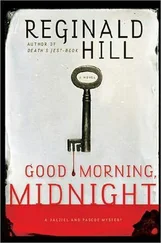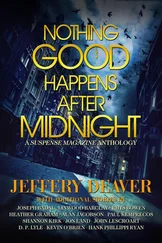Iris was sitting on the upside-down hull, tapping out a jazzy rhythm with the butt of the fishing rod.
“Ahoy,” he called, and she jumped up.
Together they flipped the boat over and shoved it into the shallows, a smooth and effortless movement by now, after all of their fishing trips. Augie went to get the oars and the net, and then they pushed off from the shore. He let them float for a few minutes, closing his eyes, listening to the lap of the water against the earth, against the hull, and feeling the heated gaze of the midnight sun on his face. When he opened his eyes, Iris was hanging her legs over the side of the dinghy, the tips of her toes dragging on the lake, leaving brief ruts in the water: there and gone, there and gone. He dipped the blades of the oars beneath the glassy surface and began to row.

SUMMER SEEMED TO fade faster than it had arrived. The warmth seeped out of the valley and a cold front crept in, chilling the delicate wildflowers and icing the muddy shores of the lake with frosty crystals. Augustine continued to sit in his Adirondack chair by the lake, watching the progression of time, the descent of the sun, but now he bundled himself again in woolly layers. The cold returned to his bones, his joints, his teeth. He didn’t leave the camp anymore. Iris wandered the tundra and the mountains alone. They still fished together, taking the dinghy out for as long as the lake would allow it, but rowing had grown difficult for him in the cold air and the frosts fell heavier with each passing week. It won’t be long now, he thought.
Augustine continued to scan the bands once a day in the radio shelter, but the silence was perpetual, the isolation complete. He listened only out of a need for work, for purpose. As the days passed and grew colder, getting from his chair to the shelter and back again escalated from a pleasant stroll to a challenge. Augie hoarded his energy for the short walk, unwilling to give it up. He became unable to row the dinghy even a short way. Eventually a thin rind of ice formed at the edges of the lake. It’s just as well, he thought. Not long after, the sun finally reached the horizon and dipped beneath it before climbing back up. The sunrise/sunset concert it created was magnificent and lasted several hours, bathing the mountains in a fiery orange glow and sending spurts of violet cloud into the sky before fading back into vivid blue. These moments of day’s end and day’s beginning, pressed together into a continuous event, became a regular marker of time’s passing.
The lake froze, then melted, then froze once more. One afternoon, as the sun dipped behind the mountains and hid there briefly, a cold drizzle began to fall. In the cool twilight, the rain hardened into sleet and then softened into thick, white flakes of snow, which drifted slowly down and covered the brown landscape. Augie had retreated from his chair when the drizzle began, but he returned to it when the sleet changed to snow. Iris joined him, sitting on his little footstool made from a packing crate, and together they watched the contours of the land disappear beneath a blanket of white. When the sun cleared the mountains a few hours later it bathed the freshly covered peaks in pale fire, and as it climbed higher the tundra burned brightly, a field of white flame. The familiar cloak of the Arctic had returned and would not be shrugged off for many months to come.
The stars also returned. One night, after the color-soaked mountains had dimmed and then darkened into black peaks set against a sleepy blue sky, Augie walked down to the edge of the frozen lake to test the ice. He tapped it with his boot, and when it held he took a few cautious steps, giving it another tap and finally a good hard stomp. It was firm. It would hold him. He walked back to the shore and headed toward the radio shed. He noticed a set of fresh tracks in the snow, illuminated in the starlight, leading down from one of the hills and then disappearing at the edge of the lake. The prints were enormous and widely spaced, with the pricks of long claws indented around the impressions: polar bear prints. Here? He was surprised—forgetting the radio for a moment he doubled back, following the tracks to the shore, where they disappeared onto the ice. He bent down to examine the shallow scratches on the surface where the bear had dug in as it crossed the frozen water. Perhaps it was on its way to the fjord, he thought. Perhaps it was lost. He shrugged and turned back toward the radio shed.
Slipping the headphones over his ears, he began to scan, adjusting the controls in the soft glow of the flickering kerosene lamp. The static was soothing—it obscured the utter silence of the Arctic, a silence so complete it seemed unnatural. The lapping of the water had ceased, the air was still, the birds had all gone. The silence of winter had descended. The terns had left their beautiful nest, flying south toward the other pole, and the musk oxen and caribou had returned to the wide-open tundra. Every now and then the quiet was punctuated with the long, trembling howl of a wolf, but otherwise the lake was wrapped in hushed stillness. The white noise of the radio waves was a relief, a soft crackle to obscure the loneliness. He set the receiver to scan automatically and closed his eyes—let his consciousness drift. He’d fallen asleep when he heard it: a voice, slipping through his eardrums and into his dreams. He bolted upright and pressed the headphones against his ears. It was so faint Augie wasn’t sure he’d really heard it. But no, there it was again—not words, just syllables, interrupted by static. He strained to make out what they were saying and pulled the microphone toward him, suddenly unsure how to respond. The language of amateur Q codes abandoned him in his excitement, but it didn’t matter. The FCC wasn’t listening anymore.
“Hello?” he said, then realized he was practically shouting. He waited, straining to hear a response. Nothing. He tried again, and again, and finally, on the third try, he heard her. A woman’s voice, clear as a bell.
MARS WAS BEHIND them and the pale blue dot of Earth was growing larger by the day. They began to spend their spare moments in the cupola, watching the color of the atmosphere become more vivid as they moved closer—everyone except Sully. She kept long hours in the comm. pod, dividing her time between tracking the Jovian moon probes and listening for signals from Earth as they drew closer to home. She barely interacted with the others. She usually slipped out of the centrifuge early, as the artificial sunrise began to dawn, and returned to it late, when the others were already in their bunks. There was nothing, not so much as an errant cable news broadcast or a Top 40 countdown, but she kept listening. The nearer they came, the more likely it would be for their antenna to pick up a signal. In times of disaster, ham operators were always the first to get information flowing along the airwaves; surely, she thought, there would be some chatter. There had to be. There was still no theory that made sense, no possible explanation for the silence. But gradually they had accepted it.
They were close enough to see the moon circling their little blue planet when Sully finally lost track of her probe on Io. It wasn’t unexpected—the conditions on Jupiter’s closest moon weren’t kind, and the probe had already outlasted its expected life span. It was an overachiever, yielding extraordinary data, but Sully was nonetheless saddened by the silence. There were only so many signals out there, and having one less to keep track of—first Voyager, now this—made her feel even more lost. There were so few things to hang on to. The universe was an inhospitable place, and she felt fragile, temporary, lonely. All of their tenuous connections, their illusions of security, of company, of camaraderie, were disappearing. Judging by its last transmission, the probe had strayed into volcanic territory, away from the sulfur dioxide snowfields they had set it down in. Its final temperature readings suggested submersion in lava—and even NASA didn’t design things that could survive that.
Читать дальше












